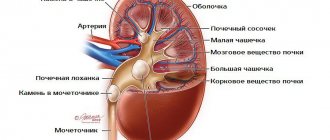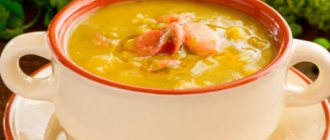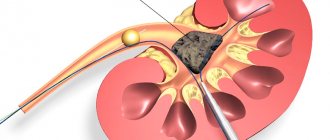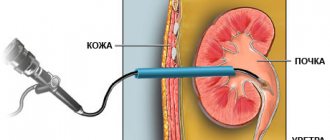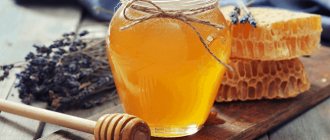Kidneys perform important functions in the human body. In addition to the main excretory function, the kidneys are involved in regulating blood pressure and producing hormones. The sedentary lifestyle of a modern person has a negative impact on the condition of the kidneys. The most common problem is the formation of kidney stones. Kidney stones can cause severe pain. In terms of pain intensity, renal colic ranks first on the pain scale compiled by doctors.
Drink enough plain water
Not drinking enough water can cause significant damage to your kidney health and increase your risk of developing kidney stones. The fluid helps the kidneys clear metabolic waste from the body. If they are not removed in a timely manner, they begin to crystallize, turning into stones. Drinking enough fluids daily significantly reduces the risk of kidney stones.
The color of urine can indicate a lack of fluid in the body. It is usually dark yellow in the morning due to the accumulation of waste that the body produces during the night. But if the dark shade of urine persists throughout the day, it means that the body does not have enough water. The average amount of liquid consumed should be 8-10 glasses. This volume may include water, other drinks and liquid foods. But it is important not to overdo it with the water diet, otherwise kidney function may be impaired.
Prevention of urate stones
If the patient already has stones of this type, or is at risk, he should avoid offal (heart, lungs, liver, kidneys) and cooking with cooking and animal fats. Spicy sauces and strong broths made from meat are prohibited, the same applies to beer and red wine.
If you have urate stones, you should avoid cocoa, coffee and tea. It is necessary to limit the amount of salt in dishes, eat less shrimp and red fish, grains, white bread, Brussels sprouts and legumes.
The basis of the diet is plant and dairy products. Meat is almost never used; instead, any amount of fruits and vegetables is used. Daily fluid intake is up to 2.5 liters. This is purified water, alkaline types of mineral water (Essentuki), grape juice.
Products allowed to be consumed:
- wild strawberries, strawberries, eggplants;
- lemon, sorrel, black currant and other products enriched with ascorbic acid;
- candied fruits, nuts;
- any desserts, excluding fresh pastries and chocolate;
- dairy products.
Berries should be present in the patient’s diet.
Black currants and grape juice, herbal mixtures with a diuretic effect are good for removing urate stones.
Eating foods rich in calcium
A decrease in calcium in the menu leads to an increase in the amount of oxalates (esters and salts of oxalic acid) in the body, which gradually causes urolithiasis. Calcium binds to oxalates in the intestines, which prevents their absorption into the blood and penetration into the kidneys. According to research published in the Annals of Internal Medicine in 1997, high dietary calcium consumption helped reduce the risk of kidney stones, while consuming calcium supplements, on the contrary, increased the chances of developing urolithiasis.
Therefore, it is better to consume food products rich in calcium rather than calcium supplements (milk, cottage cheese, kefir, sesame seeds, whole grain wheat products, etc.). At the same time, it is useful to take sunbathing in the morning (about 15 minutes a day) to help the body produce vitamin D, which is necessary for the proper absorption of calcium.
Treatment: how to proceed correctly?
Treatment is prescribed only after the type of stones has been determined.
You should not take medications on your own if you have severe pain.
First of all, you need to see a doctor - a urologist or nephrologist. It is prohibited to take medications or relieve pain on your own. This may make the condition worse. If the stones are mobile and damage organ tissue, and are also large in size, surgical intervention is used. In milder cases, conservative treatment can be used.
Painkillers such as Baralgin and Trigan will help relieve pain. For crushing and removing stones, Avisan, Cyston, Uroflux, Cystenal, Rovatinex, and Fitolit are used. Folk remedies used include horsetail, dill seeds, bearberry, birch buds, rue, St. John's wort, lingonberries, mint, cinquefoil, and corn silk.
Avoid a diet rich in oxalate
It has been scientifically proven that regularly and generously consuming oxalate-containing foods can increase your chances of getting kidney stones. Oxalates prevent calcium from being absorbed into the body, which in turn leads to the formation of calcium oxalates, which turn into stones. This is especially true for people who have a high risk of developing urolithiasis. They should be careful when choosing diets that are excessively rich in oxalate-containing foods such as: sorrel, spinach, rhubarb, cabbage, celery, chard, beets, chocolate, strawberries, etc. In addition, they should not overdo it with vitamin C intake, otherwise it accumulates and is converted into oxalates.
Limit salt in your diet
Sodium-rich foods contribute to the accumulation of calcium in the urine and the formation of kidney stones. Calcium increases the amount of urinary protein, which can lead to kidney disease. In addition, the kidneys are forced to work extra hard to remove excess sodium from the body. This way they quickly wear out and become vulnerable to disease. Diets low in salt (no more than 5 g per day) are good for preventing kidney stones. Instead of regular table salt, it is better to use sea salt, as well as spices and aromatic herbs.
Characteristics and symptoms of the disease
Nephrolithiasis can be caused due to unfavorable internal and external factors
Nephrolithiasis can be caused due to unfavorable internal and external factors. Of course, the cause of the formation of kidney disease can be individual for each person, however, with a complete and comprehensive examination, all factors are identified immediately. Urine contains a fairly wide chemical composition. A healthy person may periodically experience oversaturation of urine with various saline solutions. However, due to the presence of special beneficial substances in it, the concentration of salts is always under control and normal. There are situations when the concentration and chemical composition of urine changes, for example, an increase in acidity, as a result of which kidney stones appear. Symptoms of nephrolithiasis include:
- hereditary predisposition;
- physical characteristics and properties of water;
- sedentary lifestyle, for example, long-term fractures of the spine, pelvic bones;
- chemical composition of the soil.
In medical practice, there are cases of the disease occurring against the background of infectious diseases of the urinary system, pathologies of internal organs, impaired urine output, due to kinking or narrowing of the urinary canal. According to statistics, the development of nephrolithiasis in men is twice as high as in women. Women tolerate the disease quite poorly; most often nephrolithiasis becomes more severe and causes complications. The presence of cameos or sand in the kidneys, as a rule, gives pain and attacks such as:
Apaan Mudra for the treatment of diseases and restoration of the kidneys
- cramps and pain during urination;
- the presence of blood and blood cells in the urine;
- acute and unbearable pain in the lumbar region and lower abdomen;
- pain when walking.
For information! When a large stone passes from the kidneys, the patient suffers from attacks of nausea, vomiting, dizziness, and his health deteriorates sharply.
Use less sugar and sweeteners
Foods high in sugar and fructose can also provide a favorable environment for the formation of kidney stones. High sugar intake leads to an imbalance of minerals in the body, interfering with the absorption of calcium and magnesium. In some cases, fructose can be metabolized into oxalate. Industrial sweeteners are also not particularly beneficial for the body, reducing kidney function. Instead of sugar and fructose, it is better to add natural honey, leaves or stevia extract to tea or coffee.
Nutrition for urates
To reduce the risk of urate formation, the patient should eat: rye bread, lean meats, boiled fish, cereals (except buckwheat), lean soups, instant coffee or weak tea and jelly from vegetables and fruits with a minimum content of vitamin C. Drink at least 2 .5 liters of water per day.
You can reduce the risk of urate formation by eliminating from the diet: fatty meats, rich broths, legumes and buckwheat, natural coffee, chocolate, sour berries and fruits.
Reduce red meat consumption
Protein is definitely good for your health, but eating too much red meat is bad for your kidneys. Excess protein increases the metabolic load on the kidneys and disrupts the nitrogen balance in the body, which is harmful to the health of the kidneys and the entire body. Red meat is high in purines, which activate the production of uric acid in the body. This lowers the overall pH of the urine, and the high concentration of acid in the urine creates a favorable environment for the formation of kidney stones.
What are kidney stones?
First of all, let's find out what kind of stones we are talking about. These are small crystals consisting of calcium, phosphates, oxalates or carbonates. They are formed due to the fact that a large amount of minerals accumulates in the body, which it cannot properly absorb. As a result, they settle in the urinary tract.
The smallest of them are easily excreted in the urine, but larger formations “get stuck” and cause the following symptoms:
- Abdominal pain
- Frequent and painful urination
- Pain in the sides or back
- Fever and chills
- Nausea and vomiting
- Blood in urine
- Burning sensation when urinating
Do daily exercise to maintain a healthy weight
Obesity increases the risk of developing kidney stones, so daily exercise will be very helpful in preventing kidney stones. Regular moderate exercise reduces the risk of many factors associated with kidney stones, according to a study by the American Society of Nephrology. It is not necessary to spend 2-3 hours in the gym for this. It is enough to devote about 30 minutes to simple training (running, walking, cycling, exercise) five times a week.
Avoid drinking fluoridated water, which is harmful to the kidneys.
Drinking fluoridated water is another harmful product for the kidneys. Researchers in the field of urology claim that regular consumption of water with an abundance of fluoride leads to the formation of kidney stones. The first sign that a person is consuming too much fluoride is the discoloration or characteristic staining of tooth enamel, which is a condition known as dental fluorosis. To avoid such problems, it is better to drink bottled, settled and boiled water or use fluoride water purification systems in the home.
Lifestyle
An unhealthy lifestyle leads to deterioration in the functioning of internal organs and the occurrence of diseases.
A healthy lifestyle prolongs life and improves health. It is important to follow these recommendations:
- Eat properly.
- Drink clean water.
- Exercise regularly.
- Dress for the weather.
- Observe personal hygiene rules.
- Healthy sleep.
- Maintain a daily routine in accordance with the biological rhythms of the body.
- Walks in the open air.
- Temper yourself.
- Eliminate bad habits.
